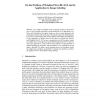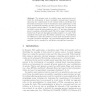178
click to vote
DLOG
2011
14 years 6 months ago
2011
Evolution of Knowledge Bases expressed in Description Logics (DLs) proved its importance. Most studies on evolution in DLs have focused on modelbased approaches to evolution semant...
146
click to vote
DLOG
2011
14 years 6 months ago
2011
We show that, although conjunctive queries over OWL 2 QL ontologies are reducible to database queries, no algorithm can construct such a reduction in polynomial time without changi...
147
Voted
DLOG
2011
14 years 6 months ago
2011
Completion algorithms for subsumption are investigated for many extensions of the description logic EL. While for several of them subsumption is tractable, this is no longer the ca...
141
click to vote
DLOG
2011
14 years 6 months ago
2011
Abstract. The preferential and rational consequence relations first studied by Lehmann and colleagues play a central role in non-monotonic reasoning, not least because they provid...
168
Voted
DLOG
2011
14 years 6 months ago
2011
Abstract. For a number of problems, such as ontology learning or image labeling, we need to handle uncertainty and inconsistencies in an appropriate way. Fuzzy and Probabilistic De...
144
click to vote
DLOG
2011
14 years 6 months ago
2011
Abstract. The pressing need for scalable query answering has motivated the development of many incomplete ontology-based reasoners. Improving the completeness of such systems witho...
148
click to vote
DLOG
2011
14 years 6 months ago
2011
Query answering in Ontology Based Data Access (OBDA) exploits the knowledge of an ontology’s TBox to deal with incompleteness of the ABox (or data source). Current query-answerin...
159
click to vote
DLOG
2011
14 years 6 months ago
2011
Recent research has shown that labeling ontologies can be useful for restricting the access to some of the axioms and their implicit consequences. However, the labeling of the axio...
126
click to vote
DLOG
2011
14 years 6 months ago
2011
We introduce an extension of Description Logics (DLs) for representing and reasoning about contextualized knowledge. Our formalism is inspired by McCarthy’s theory of formalizing...
125
click to vote
DLOG
2011
14 years 6 months ago
2011
This paper introduces relaxed abduction, a novel non-standard reasoning task for description logics. Although abductive reasoning over description logic knowledge bases has been ap...


